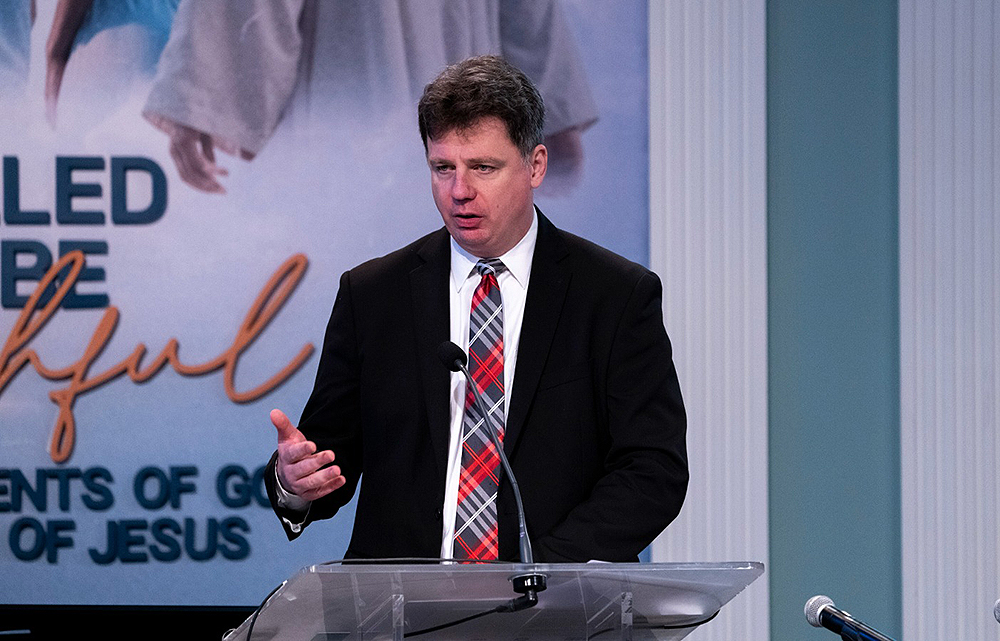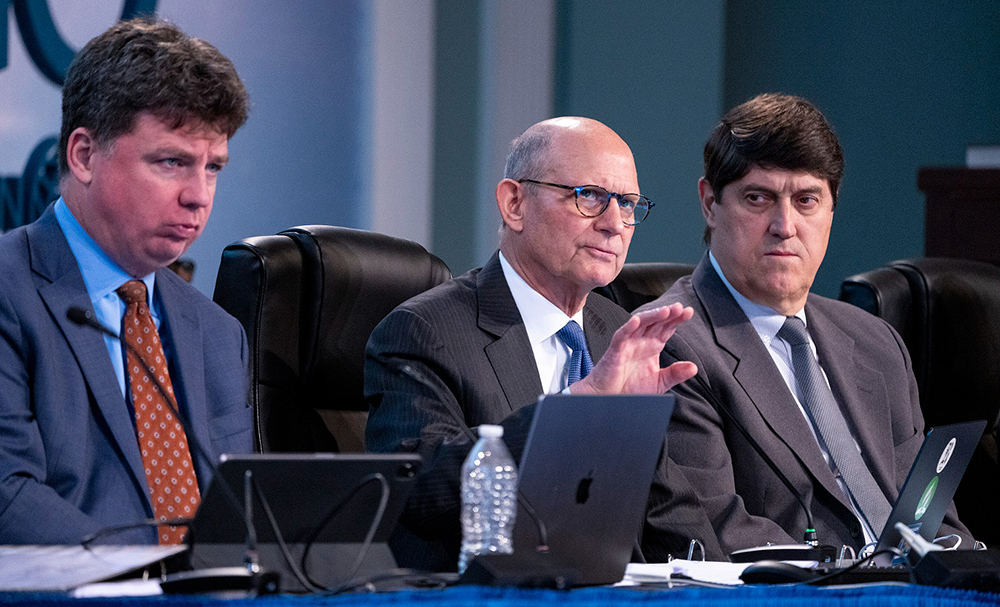Amended Rules of Order Seek to Expedite, Prevent Delays in Church Business
Adventist Church GC Executive Committee members overwhelmingly support changes.
April 16, 2025 | Silver Spring, Maryland, United States | Marcos Paseggi, Adventist Review
“There’s one item that I would like to call to the attention of all those who chair meetings,” said General Conference (GC) president Ted N. C. Wilson during the second day of the GC Executive Committee (EXCOM) Spring Meeting in Silver Spring, Maryland, United States, April 9.
He then referred those following the business session in person or online to the document titled “Procedural Rules for General Conference Sessions and Executive Committee Meetings,” which includes an introduction. It was written, Wilson noted, by the late Bert Beach, former director of the Public Affairs and Religious Liberty Department of the General Conference.

Todd McFarland, General Conference deputy general counsel, shares a report about suggestive changes to a document titled “Procedural Rules for General Conference Sessions and Executive Committee Meetings” during Spring Meeting on April 9. [Photo: Enno Müller, Adventist Review]
Wilson read a small portion of that introduction, something that, he told GC EXCOM members, “you as chairs need to keep in mind and pull it out when things get really rough in your meetings.”
He read, “ ‘These rules of order are intended to be used with a sense of reverence for the divine purpose. They are not intended to provide for quick or dilatory parliamentary maneuvers to gain a point, gain undeserved attention, gain advantage by suppressing the wishes of others, or to confuse the chair, fellow delegates, or committee members.’ ”
Wilson kept on reading: “ ‘These rules, furthermore, should not be used in such a way as to become an excuse for procedural wrangling, which could keep sessions or committees from moving forward with dispatch. Ellen White counsels that there should be “constant effort for brevity in business meetings.”* It must never be forgotten that the letter of procedural rules can kill. It is the spirit that gives life to church order and government. The chair, with the support of the delegates, must use good judgment and not let the machinery get in the way of the advancement of God’s work.’ ”
“Read it for yourselves if you haven’t read it lately,” Wilson suggested GC EXCOM members. “And use it, when you get into a difficult situation, not to lecture people necessarily, but to help them understand that we are brothers and sisters doing God’s business.”
Wilson then explained that in the process of doing that, “we do need some regulations.” He then invited Todd McFarland, GC deputy general counsel, to present some of the adjustments that, according to Wilson, “will help to clarify proceedings when we have these meetings, General Conference Sessions, and meetings in other places.”

Ted N. C. Wilson (center), General Conference president, introduces a report that suggests changes to the document titled “Procedural Rules for General Conference Sessions and Executive Committee Meetings” during Spring Meeting on April 9, as Todd McFarland (left), deputy general counsel; and Gerson Santos (right), associate secretary of the General Conference, look on. Photo: Enno Müller, Adventist Review]
What Changes, and Why
McFarland explained those changes that went beyond those of capitalization or the addition of gender-neutral language where appropriate. For instance, he explained that since voice vote is not the only method currently used, the new document makes clear that the chair generally chooses the method of voting, and that, if the body would like to use a different method, they could do that by a motion that, if seconded, needs a majority vote to pass.
A sentence was added regarding abstentions during a vote, McFarland shared. The added sentence now clarifies that “abstentions, even if indicated on a ballot, are not considered cast votes and do not count for determining the outcome of any vote.” “Interestingly, that’s not the rule in all legislative bodies,” McFarland said.
McFarland also explained that the document sought to be more explicit regarding referrals back to the Nominating Committee when there is an objection to a whole report or part of it. The added text clarifies the discretionary role of the chair of the session. It now reads, “The chair may accept the referral at his or her discretion. To facilitate deciding whether to accept the referral, the chair may request the person(s) seeking the referral to consult with the Nominating Committee chair regarding the reason for seeking the referral. If the request becomes a motion, it is nondebatable and it is decided by simply majority vote.” This, explained McFarland, “conforms the rules more explicitly to our practice.”
McFarland also shared that after some experiences at GC Sessions, especially in 2015, when multiple points of order were presented in rapid succession, it was noted that points of order were not explicitly defined in the rules of order. “They were actually called ‘questions of privilege,’ ” McFarland said. The current amendments to the document tried to offset that, he explained, by defining points of order. “It also gives a little more definition of what is a point of order.”
He also explained that a new section seeks to give the chair “more tools to deal with points of order if they start to become obstructive or not moving the issue forward.” He illustrated, “The chair will now be able to say, ‘Listen, the points of order being raised are not really points of order.’ . . . The chair will now be able to cut that person off sooner than later and ask them to make a point of order.”
The added text now reads, “A question of privilege or point or order is not to be used to debate the pending motion or to gain the floor before other delegates. When recognized for question of privilege or point or order, no other motion may be made. Delegates raising such a question or point should immediately state the basis for the question of privilege or point of order. If the chair does not immediately hear the reason for the question of privilege or point of order, the chair should interrupt the delegate and ask that it be stated. If the chair believes that delegates are raising frivolous questions of privilege or points of order for an improper purpose (to be recognized ahead of other delegates, to delay, or to obstruct the work of the body), the chair may, after giving warning to the body, decline to recognize speakers who rise to raise a question of privilege or point of order.”
The motion to amend the GC rules of order passed, 131 to 1.
*Ellen G. White manuscript 3, 1890, p. 9.